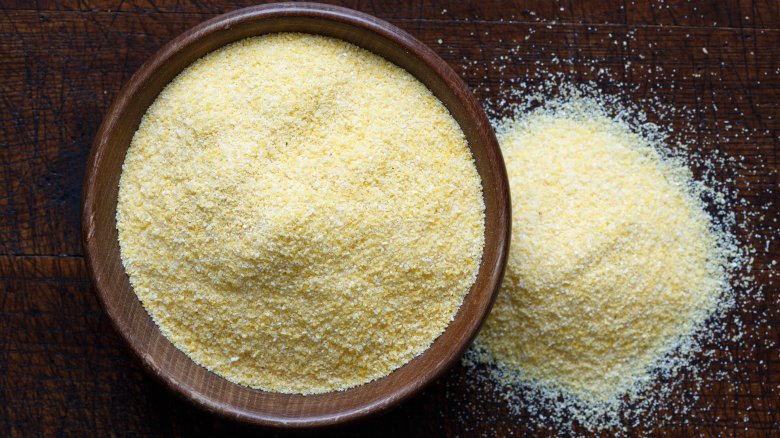Here's What You Can Substitute For Cornmeal
Nothing complements a bowl of chili quite like a slice of fresh cornbread. If you find yourself coming up short when searching for cornmeal in the back of your pantry, it's understandable that the cornbread may not happen. Luckily, there are some shortcuts you can take when you're out of cornmeal.
If you want to make cornbread without cornmeal, which is not an impossible feat to pull off, you'll need to get a little clever with the ingredients. Food Network recommends that for their no-cornmeal cornbread, you use all-purpose flour combined with a mixture of corn kernels, sour cream, and sugar to deliver a tasty corn flavor.
Obviously, there are many uses for cornmeal besides baking cornbread, and as such, there are plenty of substitutes for it, depending on what you're making. Because cornmeal is simply ground corn, it's great for recipes that call for a little more texture than traditional flour. Organic Facts recommends that the most obvious substitute for cornmeal is polenta. According to The Kitchn, polenta is essentially the same as cornmeal, only its grind is a little different and it's typically made with yellow corn because that's what's called for in the Italian dish from which it derives its name. It's a little more expensive than cornmeal, but can be used just the same if you've got it hanging around.
Corn grits and corn flour also make great alternatives to standard cornmeal. The grits tend to be a little coarser than traditional cornmeal, so you may need to alter how much you use when mixing with liquids. On the opposite end of the spectrum, corn flour has a finer grain than cornmeal and is typically used as a drying agent, but works great for typical cornmeal uses such as breading and frying fish.
Perhaps you need a substitute that doesn't come from corn at all. Not to worry, we've got those, too. Ground flaxseed is a great choice for the health-conscious or those who may have a corn allergy. Texturally it's very similar, but it does tend to be more bitter than cornmeal, so if you want the sweetness that comes with cornmeal you may need to add some sweetener. Semolina, a type of flour that Bob's Red Mill says is made of durum wheat and is commonly used in Italy, can also be a great textural substitute — although it doesn't have much in common with cornmeal on the flavor front.
Using these cornmeal substitutes can be a great way to test your cooking skills and who knows, you may find that you prefer using the alternatives to the real thing.
